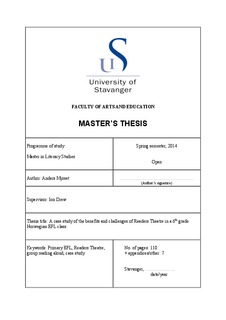| dc.description.abstract | This thesis is based on a case study of using Readers Theatre (RT), a group reading aloud activity in which pupils rehearse and perform texts, in a 6th grade English as a foreign language (EFL) class in Norway. The class comprised of 27 pupils and two teachers. The research questions aimed to find out what the cognitive and affective benefits, as well as the challenges of using RT were in the class.
Two variants of RT were used during two cycles: firstly, pre-written scripts were used, and secondly, pupils created and performed their own scripts about a Christmas story. The first cycle introduced the pupils and the two teachers to RT and lasted one week. The second cycle lasted three weeks.
Different methods were used for collecting data. The teachers were interviewed. The pupils wrote three journal entries: one before the first cycle, one after the first cycle, and one after the second cycle. Also, the researcher was a participant observer in all the English lessons during the four-week period of research. In addition, the first rehearsals of the texts and the performances were video recorded during the first cycle.
The video recordings made it possible, for example, to study some of the cognitive benefits of RT. One group was studied in detail and the improvement of pronunciation and word recognition was quantified, showing considerable improvement in pronunciation and word recognition from rehearsal to performance. Also, the members improved their reading fluency throughout the week. Both teachers commented upon the amount of text the pupils in the class had been able to read, and were excited by the impact of RT on improving the pupils’ reading ability.
The study revealed that RT was an enjoyable and engaging method in English. During the observations the pupils seemed enthusiastic about participating in the project. Most of them wrote in the journal entries that they enjoyed learning English in the RT project and working in groups. All the pupils wrote that they would like to participate in another RT project. Also, the pupils seemed to increase their confidence in reading and performing, and also in other similar activities. During plenary discussions the teachers confirmed these impressions.
The main challenge of using RT concerned the logistics in preparing the project, both finding scripts and appropriate rooms to rehearse. Another challenge was how to include the most struggling learners in the different groups. Creating a separate group for these struggling learners, with constant supervision from one of the teachers, solved this problem.
Most research on RT has been conducted in first language (L1) contexts. Little research has been conducted on RT in second language (L2) contexts and even less at the L2 primary level. In Norwegian EFL contexts, some research on RT has been conducted at the lower secondary level. This study, with its focus on EFL at the primary level, has contributed to a gap in the research on RT. The results of this research have shown that RT has a huge potential at this level, but should be followed up by, for example, more case studies in order to confirm these findings. | nb_NO |
